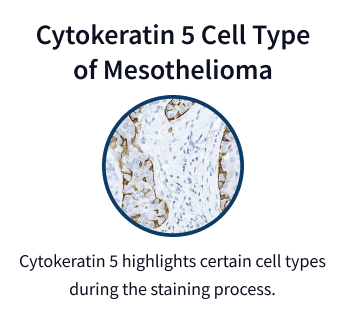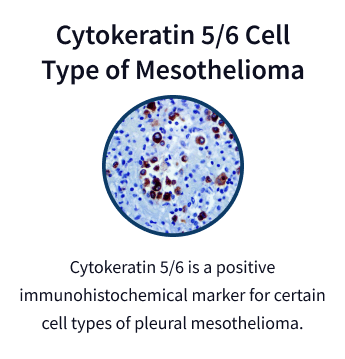Get in Touch
Have questions? Call or chat with our Patient Advocates for answers.
Cytokeratin 5 and 5/6 are proteins that help pathologists tell the difference between mesothelioma and other forms of cancer. Cytokeratin 5/6 is a positive immunohistochemical marker for certain cell types of pleural mesothelioma. It is not as useful for diagnosing peritoneal mesothelioma.

Written by Karen Selby, RN | Medically Reviewed By Dr. Jeffrey Velotta | Edited By Walter Pacheco | Last Update: June 27, 2024
Cytokeratins are keratin proteins found in the epithelial tissue. This tissue lines the outer surfaces of organs and blood vessels. They provide epithelial cells with structural support.
The different types of cytokeratins get numbered based on their location in the body.

Cytokeratin 5 lives in the cells on the outermost layer of skin in humans and animals. The KRT5 gene encodes it, which pairs with type I keratin K14.
Cytokeratin 5 has become an important biomarker for different types of cancer, including mesothelioma, breast cancer and lung cancer. CK5 has characteristics that help differentiate squamous carcinomas from adenocarcinomas.
Pathologists use cytokeratin 5 to distinguish mesothelioma from adenocarcinoma, the most common type of lung cancer. They do this by staining tissue samples with cytokeratin 5/6, an antibody that detects cytokeratins 5 and 6.
Cytokeratin 5/6 cannot identify cancerous mesothelioma on its own. Pathologists use several immunohistochemical markers when diagnosing cancer.

Learn about your diagnosis, top doctors and how to pay for treatment.
Get Your Free GuideCytokeratin 5/6 is a positive marker for malignant pleural mesothelioma in over three-fourths of cases. It is also present in certain types of lung cancers and breast cancers. Pathologists use cytokeratin 5/6 to stain cancer tissue samples.

Many doctors misdiagnose pleural mesothelioma as lung cancer, mainly if tumors have spread beyond the point of origin to other parts of the body.
Pathologists can differentiate tumor cells using immunohistochemical markers such as cytokeratin 5/6. With rare exceptions, epithelial mesothelioma is the only tumor with glandular morphologic features that shows cytokeratin 5/6.
Cytokeratin 5/6 immunoreactivity is rare in lung adenocarcinomas. If a tumor sample shows strong expression of cytokeratin 5/6, it gives pathologists a hint that the tumor is malignant mesothelioma rather than a metastatic adenocarcinoma.
However, this marker is not practical for all cell types of mesothelioma. Cytokeratin 5/6 staining is usually weak or negative for sarcomatoid mesothelioma, the least common and hardest-to-treat cell type of asbestos-related cancer.
It is also ineffective in distinguishing between pleural mesothelioma and squamous cell carcinomas, which account for about 25% to 30% of all lung cancers.
Several studies have evaluated cytokeratin 5/6 as a diagnostic marker for mesothelioma.
Cytokeratin and p63 are effective in differentiating cancers of unknown primary sites. A 2001 study in the American Journal of Clinical Pathology showed this fact. The study included 14 malignant mesotheliomas.
Both cytokeratin 5/6 and calretinin are markers for mesothelioma in effusion samples. Effusion, or excess fluid buildup, is a common symptom of pleural and peritoneal mesothelioma.
Cytokeratin 5/6 staining was present in the study in 33 of 34 mesothelioma cases. At the same time, only six of 67 adenocarcinomas tested positive for the protein.
The study noted cytokeratin 5/6 staining may be less functional for peritoneal effusion specimens. Metastatic adenocarcinomas are more likely to express the marker in the abdomen.
A 2002 study in Modern Pathology cautioned against using cytokeratin 5/6 to differentiate mesothelioma from metastatic adenocarcinoma. The study showed that many types of nonpulmonary adenocarcinomas may be positive for cytokeratin 5/6. Pathologists must rely on other markers as well.
Recommended ReadingYour web browser is no longer supported by Microsoft. Update your browser for more security, speed and compatibility.
If you are looking for mesothelioma support, please contact our Patient Advocates at (855) 404-4592
The Mesothelioma Center at Asbestos.com has provided patients and their loved ones the most updated and reliable information on mesothelioma and asbestos exposure since 2006.
Our team of Patient Advocates includes a medical doctor, a registered nurse, health services administrators, veterans, VA-accredited Claims Agents, an oncology patient navigator and hospice care expert. Their combined expertise means we help any mesothelioma patient or loved one through every step of their cancer journey.
More than 30 contributors, including mesothelioma doctors, survivors, health care professionals and other experts, have peer-reviewed our website and written unique research-driven articles to ensure you get the highest-quality medical and health information.
My family has only the highest compliment for the assistance and support that we received from The Mesothelioma Center. This is a staff of compassionate and knowledgeable individuals who respect what your family is experiencing and who go the extra mile to make an unfortunate diagnosis less stressful. Information and assistance were provided by The Mesothelioma Center at no cost to our family.LashawnMesothelioma patient’s daughter


Selby, K. (2024, June 27). Cytokeratin 5 & 5/6 and Mesothelioma. Asbestos.com. Retrieved October 21, 2024, from https://www.asbestos.com/mesothelioma/diagnosis/immunohistochemical-markers/cytokeratin/
Selby, Karen. "Cytokeratin 5 & 5/6 and Mesothelioma." Asbestos.com, 27 Jun 2024, https://www.asbestos.com/mesothelioma/diagnosis/immunohistochemical-markers/cytokeratin/.
Selby, Karen. "Cytokeratin 5 & 5/6 and Mesothelioma." Asbestos.com. Last modified June 27, 2024. https://www.asbestos.com/mesothelioma/diagnosis/immunohistochemical-markers/cytokeratin/.
A medical doctor who specializes in mesothelioma or cancer treatment reviewed the content on this page to ensure it meets current medical standards and accuracy.
Please read our editorial guidelines to learn more about our content creation and review process.
Dr. Jeffrey Velotta is an experienced thoracic surgeon and pleural mesothelioma specialist at Kaiser Permanente Oakland Medical Center in California. Velotta also serves as an assistant professor at the University of California, San Francisco.
Mesothelioma Center - Vital Services for Cancer Patients & Families doesn’t believe in selling customer information. However, as required by the new California Consumer Privacy Act (CCPA), you may record your preference to view or remove your personal information by completing the form below.
